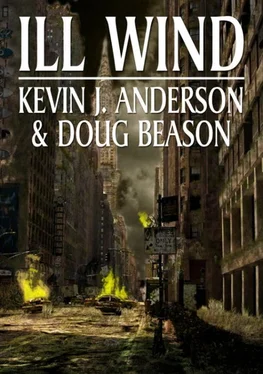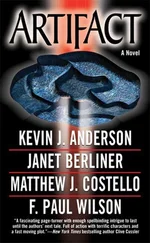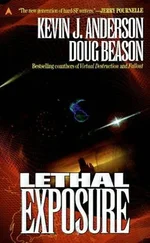It worked in Louisiana, rewarding the parishes that toed the line, and it worked in Congress when he had been Speaker of the House. The congressmen who didn’t fall in line when Mayeaux made it clear he was calling in a personal favor, found themselves suddenly without any federal projects for their districts. As far as the American people were concerned, they didn’t know how far they could push Jeffrey Mayeaux him.
Not very damn far.
The chairmen of their respective services sat back in their seats and waited for the president to speak his words of wisdom. Mayeaux felt like a preacher under a revival tent. What the hell did they want from him?
“What’s the status of the rest of the military? What other national defense matters aren’t we ready for, gentlemen?”
The question seemed to throw the officers. They looked at each other. “Each stateside installation is utilizing its resources to enforce martial law, Mr. President. They are relying on the National Guard as well as local law-enforcement groups. None of our forces is poised to prevent an attack from an external threat, but frankly I don’t see how such an attack could be feasible without any fuel—”
Mayeaux dismissed the observation with a wave. “Not an attack from outside, from within. If civilian disobedience is affecting every installation, we’ve got to get those commanders firmly in control. We’ve got to let the people know we won’t take any crap. These are not normal times.”
The five officers remained stone-faced, keeping their thoughts to themselves. What a bunch of nippleheads! Mayeaux pushed back from the conference table, feeling his control slipping away. Didn’t anybody take this seriously ? Well, if they weren’t going to come up with a solution, then he sure as hell would. He had the entire country to look after, whether he wanted to or not.
Mayeaux stood and started for the door of the Cabinet Room. “Gentlemen, get me a complete review of your forces—personnel, capabilities, whatever you’ve got. I want you all to be ready to answer questions whenever I need you. Camp out in the Old Executive Office Building. Get that information to me in one week. If things haven’t gotten better by then, I’ll make some decisions for you.” Franklin Weathersee followed Mayeaux out as he strode from the room.
In silence, everyone stood in the President’s wake.
White gypsum sand glittered like an ocean of bone-dry sparkle dust. With nothing more than a small spade, Spencer Lockwood dug only a few feet before he reached moisture.
The water table around White Sands had always been near the surface, though it had steadily fallen for the past half century, drained by massive pumping stations along the Rio Grande corridor. But not any longer, not after the petroplague. The aquifer was exceptionally pure from natural filtration—and it was available, rapidly replenishing itself.
Adjusting his floppy hat, Spencer applied a handful of soft lard on either side of the ceramic washer and tightened the cap to the water pump. A long strand of cloth-wrapped electrical wire ran from the pump to a telephone pole, then to the power substation. Transformer parts lay strewn around the substation, prominent against the bright sand: open coils of copper windings, ceramic insulators, iron cores. The new substation looked like a Rube Goldberg collection of giant tinkertoys. A hundred yards away, three ranch hands stood around a pile of scrub wood, waiting for the order to light the signal fire.
Beside him, Rita Fellenstein tipped back her Australian hat and spat to the side, adding another blot to the scattered tobacco stains on the snowy gypsum. “You really think this is going to work, Spence?”
He used the fine sand to scrub smelly animal fat from his hands, then wiped the grit on his frayed pants. “If we can’t carry power from the microwave farm to the pump station, it’ll be impossible to get it to the outlying ranches.”
“That’s not what I asked you.”
Heat shimmered from the ground like blurred fingers reaching to the sky. Spencer could see for miles all around. “There’s no reason why it shouldn’t work. Basically, it’s a no-brainer. We hook it up and it starts pumping water.”
Rita worked up a mouthful of saliva and spat again. She seemed to enjoy the disgusted frown on his face. “If you say so. You weren’t the one trying to figure out how to fix it.”
Spencer grinned, keeping his doubts to himself. “That’s what engineers are for.”
Rita strode back to the ranch hands. Her gangly legs put a rolling swing into each step. Good-natured catcalls greeted her, but Rita told the men to shut up and light the signal fire.
Spencer took one last look at the pump—he always became obsessive before starting an experiment. Everything appeared ready, but he never believed it. The transmission line ran to the substation, all the pump parts had been inspected a dozen times.
He remembered how paranoid he had been about his antenna farm on the day of the first test. Now he’d be even more excited if he could just get a simple water pump working out in the desert.
One of the ranch hands squatted by the pile of wood, striking a flint and a piece of metal together. They still had some matches among their supplies, but the cowboys liked to show off their wilderness skills in front of Rita. Fine steel wool brought in from the microwave farm caught the spark and started smoking. Pieces of shaving, then larger pieces of mesquite began to burn, crackling and sending rich-smelling smoke into the air.
Rita stood back, shielding her face as one of the ranch hands tossed a handful of green pinon needles onto the growing fire. The smoke thickened and billowed. Rita said, “All we need now is a blanket to send smoke signals!”
“We don’t want to have a conversation with them,” Spencer said. “We just want them to turn on the juice.” He knew the radio man Juan Romero would be back at the microwave farm, waiting to see the smoke.
Spencer watched the water pump, not sure what to expect. Once Romero switched on the electricity from the farm, a motor would move a series of gears—what could be so tough about that? The substation would transform the oscillating voltage collected from the microwave antennas to power the pump. If this worked, it would be the first step to reestablishing a power-grid for the area, electricity that did not rely on petroleum or plastic components for distribution.
By erecting similar antenna farms, simple metal wires spread out on flat ground under the orbital path of the smallsats, and launching the remaining satellites in storage at JPL, Spencer could return electrical power to a broad band of the country—even the world. He liked crazy, optimistic plans, but, hey, it gave them something to work toward.
A high-pitched popping, sizzling noise jarred him out of his daydream. Acrid smoke spewed from the nearby utility pole. Spencer caught the sudden smell of creosote burning. “The substation’s going up!” he yelled.
The ranchers grabbed shovels and started throwing gypsum sand on the equipment to smother the fire. White sparks danced around the transformer units, accompanied by loud snaps and cracks. The signal fire continued to blaze, sending streamers of smoke into the windless air.
“Great!” Spencer ran to the bonfire. “Help me get this thing out!” He knew Romero would keep the juice flowing until the smoke signal stopped.
The dry mesquite burned hot and bright. He picked up a bucket of sand and threw it onto the blaze; the sand simmered on the coals. Smoke continued to boil into the air. Finally, a blanket thrown over the fire extinguished the flames.
Spencer stood back and waited as the smoke leaking from the blanket turned from black to gray-white. The substation continued to crackle like an electric heater dropped into a bathtub. As the smoke trailed away, the inferno at the substation subsided. Romero had shut down. The electrical equipment looked scorched.
Читать дальше












